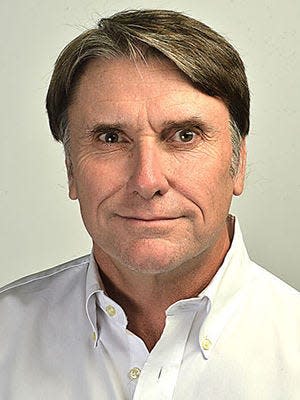Russia, Hamas, Southeast Asia reminders we seldom fully understand the world around us
Tragic as they may be, the Israel-Gaza war, Russia’s aggression in Ukraine and the death of Henry Kissinger have done something that six months ago would have seemed impossible: They have reminded people how to think.
Increasingly this century, intellectual ground has hardened and petrified. Tell us your ZIP code and we can say with relative certainty your position on any given issue.
Liberal and conservative thought, to the degree that it can be called that, now resembles trench warfare of World War I: lots of bullets and bombs hurled back and forth with lots of consequences but no movement. No one is changing their mind on abortion or book banning.

Opinion pages and cable news have become dry and dusty places, with the same people saying the same things. How many times can we hear that Donald Trump is a threat to democracy, or that everything America stands for depends on the prosecution of Hunter Biden, before our eyes and brains glaze over?
In the 20th century, a Republican president could deliver the Clean Air Act and a Democratic president could balance the federal budget. How far away do those days seem?
Yet our consideration of foreign wars and Kissinger’s legacy have served as a moldboard plow ripping up long-compacted soil, dividing previously united groups in ways that may not be entirely unhealthy.
The Ukrainian war has divided Republicans, with the Tucker Carlson faction supporting Russia, the Nikki Haley faction supporting Ukraine, and the Ron DeSantis faction supporting whatever side he believes his audience supports at any given time.
Less-traditional, take-no-quarter Republicans who have grown disillusioned with democracy understandably are apt to be sympathetic to the autocrat Putin, while Republicans who are more tuned in to Russia’s past atrocities and future threats see Ukrainian survival as essential.
The Israel-Gaza War has similarly divided Democrats, with more progressive factions breaking with what has traditionally been our lockstep support of Israel.
Younger Democrats, who are of a different era from the Holocaust or even the Arab attacks on Israel of a half-century ago do not understand why the life of an Israeli infant seems to be of more value than that of a Palestinian babe.
Yet even these lines are unstable. Elements of the Far Right, including Trump himself, have expressed admiration of hard-line Palestinian groups, while Yellow Dog Democrats are starting to grow uneasy with blank checks written to the Ukranians.
Maybe weirdest of all, Vermont’s Bernie Sanders has been hooted down for not being progressive enough, while a small plurality of Republicans (!) say that President Joe Biden’s response to the Israel-Gaza War has been “about right.”
The world is a complicated place.
No one knew this better than Kissinger, whose death has sparked a firestorm of response, some written out of admiration, but much of it expressing less deference than is usually afforded the freshly dead.
Back in the day, Kissinger was regarded as a brilliant conquering hero who did the impossible, achieving detente with the Soviets, opening China to the rest of the world and ending the war in Vietnam.
Today we know the costs. Most notably that Kissinger treated human beings as chum, expendable in pursuit of the magnificent international marlins he constantly chased. He was quite willing to overlook Chinese and Soviet human rights violations (mass murder is another name for it) so as not to affront the oppressive leaders he was courting.
Back in the day, Kissinger, like Israel, was infallible in the eyes of the American people. Perhaps the only person who saw through him — or was willing to say so — was Doonesbury cartoonist Garry Trudeau, who lampooned the great diplomat as too arrogant and pompous to understand his own shortcomings.
It’s funny how things have worked out. Kissinger and, later, Ronald Reagan were the good cop-bad cop act that triggered the breakup of the Soviet Union. Kissinger and Richard Nixon beckoned China to join the modern world, hoping its increased power would counter the Soviets.
Yet to say that Kissinger’s two greatest achievements have not worked out exactly as planned is an obvious understatement. Putin is worse than any post-Stalin Soviet premier, while China took the ball and ran with it, and is now our primary economic adversary.
By contrast, his ham-handed handling of Southeast Asia — extension of the war by three years and America’s temper-tantrum bombing of innocent countries — ultimately produced some of our greatest friends and economic partners on the world stage.
The lesson is that we seldom fully understand the world around us, which is what makes entrenched positions so futile. Thus futility turns dangerous when we refuse to debate, refuse to consider alternatives and allow others to tell us how to think.
Fortunately, America’s great gift of contrary spirit does not appear to be quite dead yet.
Tim Rowland is a Herald-Mail columnist.
This article originally appeared on The Herald-Mail: Ukraine, Israel, Kissinger: Are American's learning to think again?
